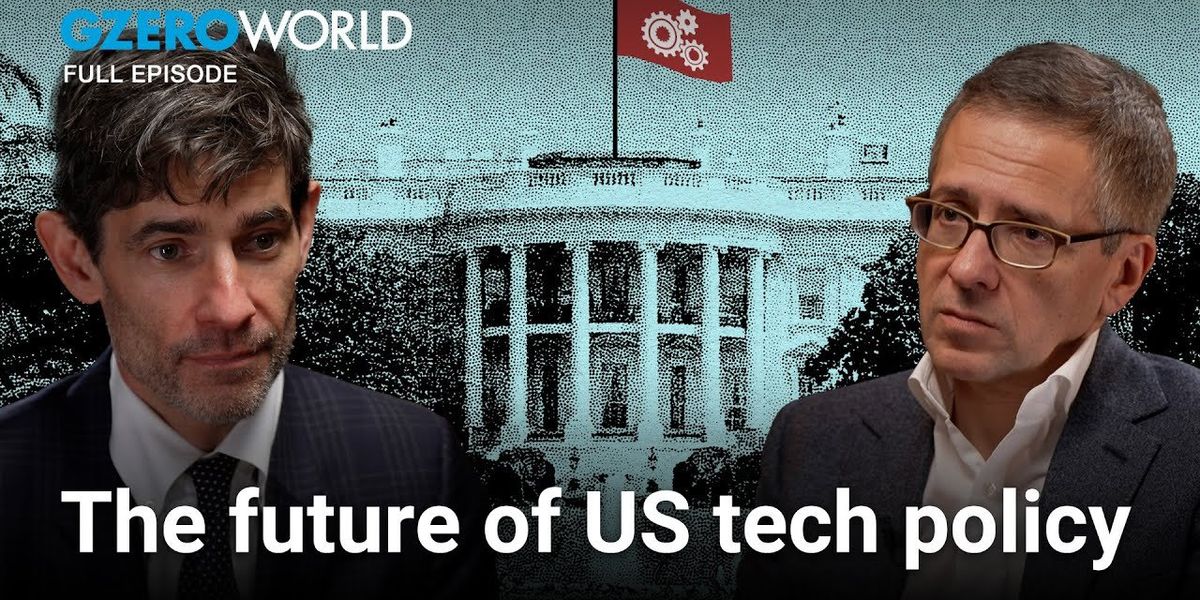Trending Now
We have updated our Privacy Policy and Terms of Use for Eurasia Group and its affiliates, including GZERO Media, to clarify the types of data we collect, how we collect it, how we use data and with whom we share data. By using our website you consent to our Terms and Conditions and Privacy Policy, including the transfer of your personal data to the United States from your country of residence, and our use of cookies described in our Cookie Policy.
{{ subpage.title }}
The Amazon logo is being displayed on a smartphone in this photo illustration in Brussels, Belgium, on June 10, 2024.
Hard Numbers: Amazon’s spending blitz, Cal State gives everyone ChatGPT, a $50 AI model, France and UAE shake hands
500,000: More than half a million new people will gain access to a specialized version of ChatGPT after OpenAI struck a deal with California State University, which has 460,000 students and 63,000 faculty members across 23 campuses. Students and faculty will be able to use a specialized version of the chatbot that can assist with tutoring, study guides, and administrative tasks for staff. The price of the deal is unclear.
50: Researchers at Stanford University and the University of Washington trained a large language model they say is capable of “reasoning” like the higher-end models from OpenAI and Anthropic. The catch? They did it while spending only $50 in compute credits. The new model, called s1, is “distilled” from a Google model called Gemini 2.0 Flash Thinking Experimental, a process that allows training fine-tuned models based on larger ones.
1: France and the United Arab Emirates struck a deal to develop a 1 gigawatt AI data center on Thursday, ahead of the Artificial Intelligence Action Summit in Paris. It’s unclear where the data center will be located, but the agreement means that it will serve both French and Emirati AI efforts.
An Amazon warehouse in the Lachine neighborhood of Montreal, Quebec, Canada, on Jan. 22, 2025.
Hard Numbers: Amazon to close unionized Canadian facility, Pentagon sends troops to border, Quebec’s new AI infrastructure fund, Freeland abandons capital gains tax
1,700: On Wednesday, Amazon announced it will close all Quebec facilities in the next two months, cutting over 1,700 jobs and outsourcing deliveries to smaller contractors. The company claims the decision is for cost savings, not related to the recent unionization at its Laval warehouse — Quebec's only unionized Amazon workforce in Canada. The CSN union federation denounced the closure as nonsensical. Workers at the Laval facility, who were seeking a $26 per hour wage, received news of the closure through an email to their union lawyer.
1,500: The Pentagon is sending 1,500 troops to secure the southern US border. The move comes two days after Donald Trump signed a series of executive orders – including one declaring a national emergency – to increase military presence at the border.
1 billion: Quebec-based Novacap Investments has successfully closed a $1 billion digital infrastructure fund, predicting that the rapid growth in AI will keep the demand for digital infrastructure high. To put this sum in perspective: Canada only raised $1.56 billion in private equity funds in the first 11 months of last year. The fund exceeded its initial $750 million target despite challenging market conditions, and it aims to invest around $100 million each in 10 regional companies providing connectivity and data services.
19 billion: Despite previously championing the tax increase as finance minister, Chrystia Freeland plans to abandon the Canadian government's capital gains tax hike policy if she wins the Liberal Party leadership race to replace Justin Trudeau. Freeland's shift against the tax hike – the policy would have generated CA$19 billion over five years – comes in response to Donald Trump’s policies and the risk of investment flowing to the US.
Big Tech under Trump 2.0
The tech landscape has shifted dramatically since Donald Trump’s first term in office: AI is booming, Meta and Google are fighting antitrust battles, and Elon Musk turned Twitter into “X.” In anticipation of Trump 2.0, social media platforms like Facebook and Instagram have announced they’ll prioritize free speech over content moderation and fact-checking. So what’s in store for the tech industry in 2025? On GZERO World, Atlantic CEO Nicholas Thompson joins Ian Bremmer on GZERO World to discuss recent shifts at Big Tech companies and the intersection of technology, media, and politics. What does the tech industry stand to gain–or lose–from another Trump presidency? Will Elon Musk have a positive impact on the future of US tech policy? And how will things like the proliferation of bots and the fragmentation of social media affect political discourse online?
“Social media platforms, in general, are shifting to the right, and they are less important than they were five years ago. They’re bifurcated, dispersed, conversations happen across platforms,” Thompson explains, “As communities split, there will be less and less one town square where people discuss issues of consequence.”
GZERO World with Ian Bremmer, the award-winning weekly global affairs series, airs nationwide on US public television stations (check local listings).
New digital episodes of GZERO World are released every Monday on YouTube. Don't miss an episode: subscribe to GZERO's YouTube channel and turn on notifications (🔔).
Big Tech and Trump 2.0: Nicholas Thompson on AI, Media, and Policy
Listen: What will the future of tech policy look like in a second Trump administration? And how will changes in the tech world—everything from the proliferation of AI and bots to the fragmentation of social media—impact how people talk, interact, and find information online? On the GZERO World Podcast, Nicholas Thompson, CEO of The Atlantic, joins Ian Bremmer to discuss the intersection of technology, media, and politics as Donald Trump prepares to return to the White House. Trump had a contentious relationship with the tech industry in his first term, but this time around, tech leaders are optimistic Trump 2.0 will be good for business, buoyed by hopes of loosening AI regulations, a crypto boom, and a more business-friendly administration. What does Big Tech stand to gain–or lose–from a second Trump presidency? Will Elon Musk help usher US tech policy into a new era, or will he create more chaos in the White House? And how concerned should we be about the dangers of AI-generated content online? Thompson and Bremmer break down the big changes in Big Tech and where the industry goes from here.
Subscribe to the GZERO World Podcast on Apple Podcasts, Spotify, Stitcher, or your preferred podcast platform, to receive new episodes as soon as they're published.
What does Big Tech want from Trump?
What does Big Tech want from Donald Trump? Trump had a contentious relationship with the industry in his first administration. But in 2025, Silicon Valley is recalibrating. On Ian Explains, Ian Bremmer looks at the parade of tech leaders who have visited with Trump since his election win, including Amazon’s Jeff Bezos, Apple’s Tim Cook, OpenAI’s Sam Altman, and moves like Meta’s recent announcement it would scrap its fact-checking program, all to get on President-elect Trump’s good side as he prepares to return to office. So what does the industry stand to gain—or lose—from a second Trump term? Loosening AI and crypto regulation and a business-friendly White House are high on the wish list. However, blanket tariffs on China and Trump's grudge against Section 230 could mean that, despite the optimism, Trump 2.0 may not lead to the big windfall Big Tech hopes for.
GZERO World with Ian Bremmer, the award-winning weekly global affairs series, airs nationwide on US public television stations (check local listings).
New digital episodes of GZERO World are released every Monday on YouTube. Don't miss an episode: subscribe to GZERO's YouTube channel and turn on notifications (🔔).
U.S. President-elect Donald Trump looks on as he delivers remarks at Mar-a-Lago in Palm Beach, Florida, U.S., December 16, 2024.
AI companies splash the cash around for Trump’s inauguration fund
Sam Altman is a longtime Democratic donor, but now he’s sending $1 million to Donald Trump’s inauguration fund. Altman, the cofounder and CEO of OpenAI, followed Amazon and Meta, which each donated $1 million too. Altman said, “President Trump will lead our country into the age of AI, and I am eager to support his efforts to ensure America stays ahead,” Altman wrote in a statement.
The AI search engine Perplexity joined in the donation spree, offering $1 million of its own money to the president-elect. Chief Business Officer Dmitry Shevelenko said he wants the company to “be a good partner to the administration.” Tech companies have made major donations in the past to presidential inaugural committees, but never in such a unanimous way. Plus, it’s a stark difference from 2021, when Joe Bidenreportedly did not accept donations from tech companies.
With these donations, tech companies are playing nice with Trump, who has been openly hostile to the industry in the past. Altman and Co. want Trump to know that they’re ready to embrace him if he embraces artificial intelligence. Not only are pricey federal contracts up for grabs, but — most importantly — AI companies desperately want to avoid stringent regulation, even if they sometimes say otherwise.Illustration of the Amazon logo next to a phone with the flagship artificial intelligence model codenamed OLYMPUS, on it.
Amazon is set to announce its newest AI model
The multimodal model, codenamed Olympus, can reportedly search video archives using text commands. It’s unclear whether it can generate video content like OpenAI’s Sora or Meta’s Movie Gen, text-to-video models that are still not broadly released to the public.
But the new model is a sign not only of Amazon’s internal ambitions but also its potentially decreasing reliance on a key investment: Anthropic, the maker of the chatbot Claude.
On Nov. 22, Amazon announced it’s investing another $4 billion into Anthropic, doubling its total investment to $8 billion. In exchange, Anthropic would commit to using Amazon’s Tranium series of chips, Amazon’s “moonshot” attempt to rival Nvidia, the world’s leading AI chip designer.
Amazon already has an enterprise chatbot called Q, as well as AI business solutions for companies through its Amazon Web Services cloud offerings. Olympus could be announced as soon as the annual AWS re:Invent conference being held this week in Las Vegas, Nevada. Matt Garman, who took over as CEO of AWS in May, will address conference-goers on Tuesday and disclose “real, needle-moving changes” on AI.
If Olympus is indeed a business-to-business offering from AWS, then perhaps Anthropic’s Claude will continue being Amazon’s consumer-facing bet while it focuses on the more lucrative work of selling to other companies.
Recently launched Amazon artificial intelligence processors that aim to tackle Nvidia and the chips made by the other hyperscalers such as Microsoft and Google are shown at an Amazon lab in Austin, Texas, in July 2024.
Amazon’s grand chip plans
Amazon is working on the third generation of its AI chips, called the Trainium2, which industry insiders told Bloomberg was a “make-or-break moment” for the company’s chip ambitions.
Luckily, they already have one important customer’s buy-in: Anthropic, which makes the chatbot Claude. On Nov. 22, Amazon announced it’s investing another $4 billion into Anthropic, doubling its total investment to $8 billion. As part of the deal, the Claude maker — perhaps the main rival to OpenAI — will continue to use Amazon’s Trainium series of chips. Amazon makes and invests in AI software and has the cloud infrastructure needed for AI – so if it can conquer the chip industry and produce chips comparable to the top models from Nvidia, it could become a dominant player in artificial intelligence.
